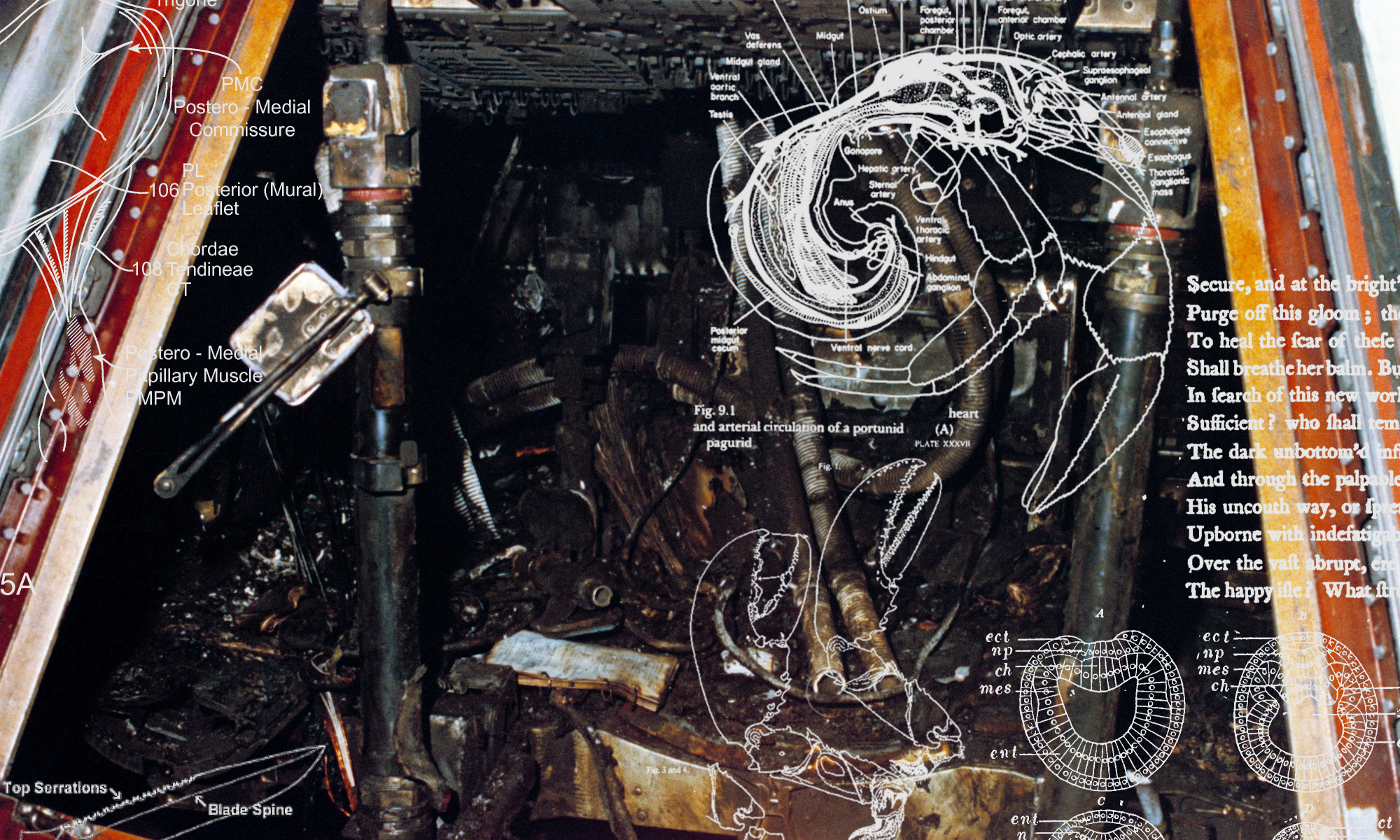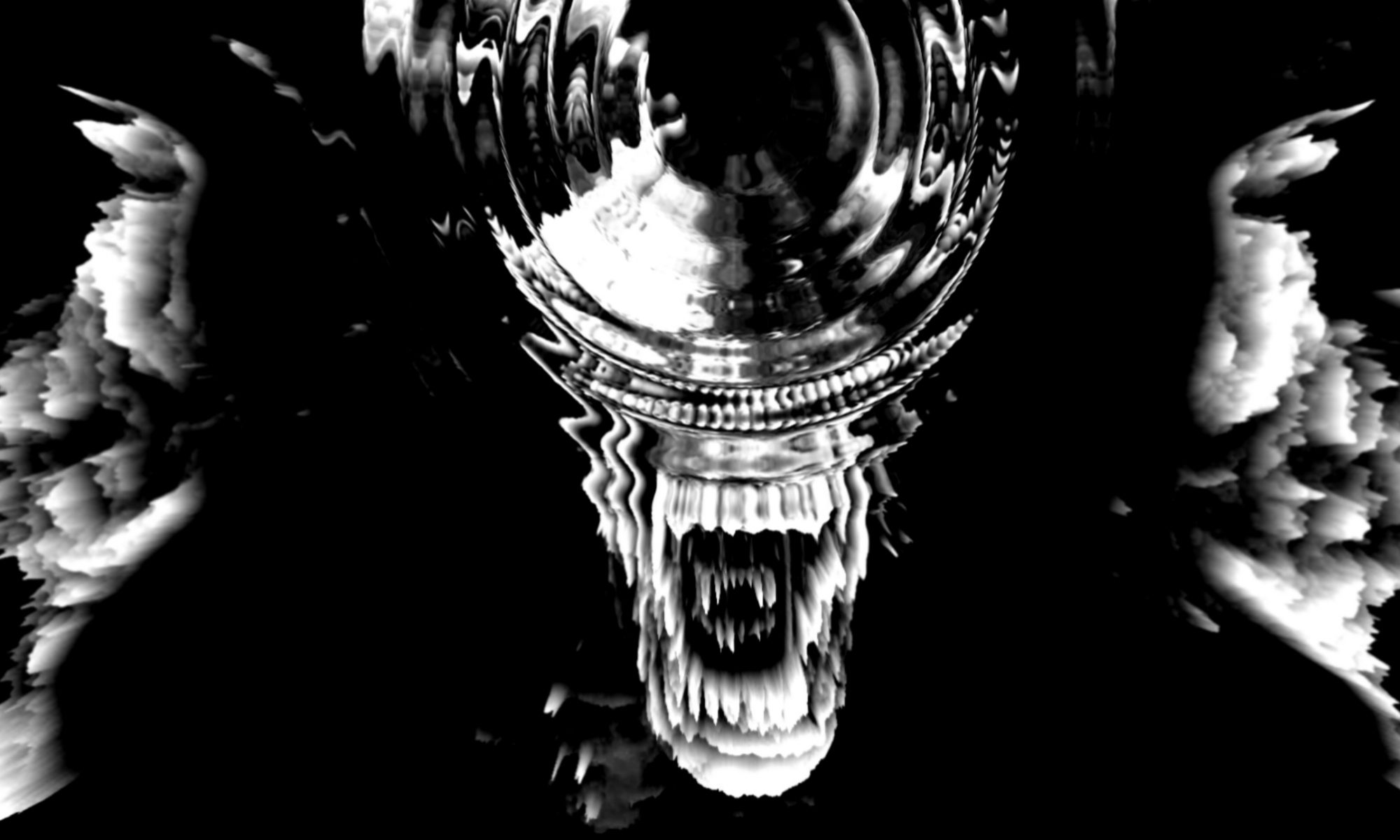by Jacob Reber
We are the poets you’ve had nightmares about, feeding on fleshy documents — infecting and injecting death into texts.
||||||||||||| vacant stares into inhuman screens
||||||||||||| vacant scares into inhuman screams
The poet works in silence, summoning the unknown to the page through monastic ritual. Transcribing texts alone. While some might work towards summoning inhuman spiritual forces, others turn towards the machinic inhuman — however, both channel the noise, the chaos, the unknown that is already here.
The collapsing of the occult and digital technologies happens through the interface — “high-speed digital technologies wash over the imaginations of those they enchant, suggestively altering our senses and captivating our networked minds”.[note]Stephen Pfohl, “Digital Magic, Cybernetic Sorcery: On the Cultural Politics of Fascination and Fear”, Code Drift: Essays in critical digital studies (CTheory Books, 2010), 53.[/note]
To plug into the outside always presents risks, opens towards the new & it cannot be undone. This space of potentiality and becoming is also one of danger and threat. The fanged poet opens with an invocation, creating passageways to the unknown.
There is only the soft glow of the screen upon the face of the fanged poet — surrounded in the darkness of the unknown, waiting. Then writing, channeling, infecting the page — puncture wounds end each sentence, dot each i, and open into a new phrase
: ; .. i i !!
The fanged poet is not necessarily or entirely human — they are mythic, animal, cyborg, prophetic, divine, etc. The fanged poet is “a dangerous, cruel alien” often positioned as “an evil outsider”.[note]Boris Groys, Art power (MIT Press, 2008), 178.[/note] They arrive from elsewhere, pouring over the edges of the human container, oozing into different material planes, emphasizing the immaterial within the material. Materiality is not negated, but revealed as a flattened world of textual sludge.
They don’t make work for people, but to invite the possibility of annihilation. Accelerating darkness without intentionality.
The fanged poet mimics humans, with retractable fangs, and subtle forms of camouflage or refractive techniques. The fanged poet is not a vampire, but more serpentine — less seductive, more venomous.
“I don’t make
work for people.”[note]Vanessa Place, “Vanessa DisPlaced | Racism vs. Censorship,”DIS Magazine. [/note]
Fangs operate through subtlety — they don’t slash, but puncture, working beneath the cover of the mouth — unseen.
The fanged poet creates traps and stands in them. They always have blood on their hands — “There’s a fantasy of possible purity, or exculpation, which is even worse.”[note]Ibid.[/note]
This is not an evil poetics, but an examination of the work that attempts to look below, to exist in a space of complicity, a messy ambivalence, covered in blood and unsure where it came from.
To extend beyond is to enter the terror, to channel the inhuman horror that was already there — we just didn’t want to open our eyes.
In “Shamanic Nietszche,” Nick Land describes Nietzsche as a ‘fanged poet at war with the philosophers’.[note]Nick Land, “Shamanic Nietzsche”, Fanged Noumena (Falmouth: Urbanomic, 2011), 221.[/note] We are interested in examining what it might mean to actually be a fanged poet — to develop a fanged poetics.
Through this text, a series of _eight_ characteristics/fixations/tells can be summoned ———
a brief note ::
[Fanged poets rarely reveal themselves — often hidden in unlit rooms, dirty machines, feedback loops, damp caves … non-sites. The fanged poet is never singular, always proliferating — this list extends beyond any individual fanged poet and comes up short — it barely reveals the material of the fanged poet, if anything at all.]

The Fanged Poet //////in 8 disastrous fragments//////
1| The fanged poet makes life more problematic
2| Sides with thought against knowledge
3| Operates through chance
4| Invasion, not expression
5| Moves towards the unknown
6| Is immoral // immor(t)al
7| The fanged poet makes poetry hideous
8| Infests, seeps through, and destroys

The fanged poet makes life more problematic
“Stories celebrate life,
poetry exults in death.”[note]Nick Land, The Thirst for Annihilation: Georges Bataille and Virulent Nihilism (London: Routledge, 2002), 199.[/note]
The poet troubles thought, making it more difficult to make distinctions, always finding the para-site, upsetting the clean fractures between positions — dwelling in ambivalence and ambiguity.[note]Ibid., 211.[/note]
Poetry is often relegated to the beautiful. Dwelling in fanciful language, sliding in clean, short lines down the page. It focuses on the flower — mimics its symmetry, pretty words, soft petals. Fanged poetry reminds us of the thorns.
Fanged poetry leads away from known feelings, truths, images, etc. It complicates and converges. The work of the fanged poet is to superimpose and reconfigure. To reframe and reconsider — “poetry is depicted as a shattering derangement of vision and a dislocation of the ego.”[note]Ibid., 143.[/note]
Sides with thought against knowledge[note]Ibid., 212.[/note]
“Poetry is not a knowledge of oneself, and even less the experience of a remote possible (of that which, before, was not) but rather the simple evocation through words of inaccessible possibilities.”[note]Georges Bataille, The Bataille Reader, eds. F. Botting & S. Wilson (Oxford: Blackwell), 111.[/note]
Conceptual fangs are not interested in readers but thinkers —
To read conceptual texts is to dwell in the horror of technocapitalism. Ambient texts, vapid nonsense, appropriated boredom, and mindless reproduction are found in reading. Thinking doesn’t provide an escape, but a way to parse the horror, to slip through, to extend and continue to distribute the material. Reading is individual processing, while thinking is downloading and replicating the dark conceptual infection.
The fanged poet doesn’t create, but rearranges, reproduces, recombines. It is a processing of flows and contact. We think and dwell in dark mental spaces, calling disorder to the page.
The only knowledge of interest to the poet is its absence — “What if knowledge were a means to deepen unknowning?”[note]Nick Land, The Thirst for Annihilation, 206.[/note] It is a pathway towards destruction — “The logic of a piece or series of pieces is a device that is used at times, only to be ruined.”[note]Sol Lewitt, “Paragraphs on Conceptual Art”.[/note]
Operates through chance
The fanged poet does not know what is possible with each text. The words generally do nothing — remain stagnant and still. But it is possible that these words could decompose — become sites of death. This form of violent becoming is always a threat.
The poetry of the fanged poet doesn’t create new knowledge or solidify — it moves: “it is not a concept to be apprehended, but a direction in which to go.”[note]Ibid., 213.[/note] It is a practice of Oulipian chance operations.
Queneau’s sonnets create the impossible task for the reader — a compressed file that would unravel the reader’s brain to try and consume.
“All ten sonnets have the same rhyme scheme and employ the same rhyme sounds. As a result, any line from a sonnet can be combined with any from the other nine, giving 1014 (= 100,000,000,000,000) different poems. Working twenty-four hours a day, it would you take some 140,000,000 years to read them all.”[note]http://www.bevrowe.info/Queneau/QueneauHome_v2.html[/note]
Not only is this impossible, but the endless recombinations are continually producing the new, bringing forth texts that have, quite possibly, never been read before. Each sonnet a command that delivers unknown results — producing endlessly in each encounter.
Invasion, not expression[note]Nick Land, “Shamanic Nietzsche”, Fanged Noumena (Falmouth: Urbanomic, 2011), 214.[/note]
A poetry of expression is not for the fanged poet. It is boring, self-indulgent, and insignificant.
“Instead of the rhetoric of natural expression, individual style, or voice, the anthology sought impersonal procedure. Instead of psychological development or dramatic narrative, it sought systems of exhaustive logical extrapolation or permutation.”[note]Craig Dworkin, “fate of the echo”, Against Expression: An Anthology of Conceptual Writing (2011), xliii.[/note]
The poet must always claim and declare all as poetry. The totalizing gesture that falls short, but tries to include the outside and/or unknown in every utterance.
In 1919, Gabriele D’Annunzio “seiz[ed] the disputed territory of the city of Fiume” and it was declared a nation-state by the artists in a Duchampian nomination.[note]Mike Watson, Towards a Conceptual Militancy (2016), 68.[/note] This literal invasion enacts some of the work of the fanged poet, materializing the impossible poetic space. The fanged poet creates, as Bataille says, “inaccessible possibilities”.[note]Bataille, The Bataille Reader, 111.[/note]
“Violence isn’t going anywhere, and it’s very useful in many respects, psychically as well as physically. And given that that’s part of our repertoire, how do we want to deploy it?”[note] https://www.artforum.com/interviews/vanessa-place-on-her-work-with-rape-jokes-67539[/note]
Moves towards the unknown
▉▉▉▉▉▉▉▉▉▉▉▉▉▉▉▉▉▉▉▉▉▉▉▉▉▉▉▉▉▉▉▉▉▉▉▉▉▉▉▉▉▉▉▉▉▉▉▉▉▉▉▉▉▉▉▉▉▉▉▉▉▉▉▉▉▉▉▉▉▉▉▉▉▉▉▉▉▉▉▉▉▉▉▉▉▉▉▉▉▉▉▉▉▉▉▉▉▉▉▉▉▉▉▉▉▉▉▉▉▉▉▉▉▉▉▉▉▉▉▉▉▉▉▉▉▉▉▉▉▉▉▉▉▉▉▉▉▉▉▉▉▉▉▉▉▉▉▉▉▉▉▉▉▉▉▉▉▉▉▉▉▉▉▉▉▉▉▉▉▉▉▉▉▉▉▉▉▉▉▉▉▉▉▉▉▉▉▉▉▉▉▉▉▉▉▉▉▉▉▉▉▉▉▉▉▉▉▉▉▉▉▉▉▉▉▉▉▉▉▉▉▉▉▉▉▉▉▉▉▉▉▉▉▉▉▉▉▉▉▉▉▉▉▉▉▉▉▉▉▉▉▉▉▉▉▉▉▉▉▉▉▉▉▉▉▉▉▉▉▉▉▉▉▉▉▉▉▉▉▉▉▉▉▉▉▉▉▉▉▉▉▉▉▉▉▉▉▉▉▉▉▉▉▉▉▉▉▉▉▉▉▉▉▉▉▉▉▉▉▉▉▉▉▉▉▉▉▉▉▉▉▉▉▉▉▉▉▉▉▉▉▉▉▉▉▉▉▉▉▉▉▉▉▉▉▉▉▉▉▉▉▉▉▉▉▉▉▉▉▉▉▉▉▉▉▉▉▉▉▉▉▉▉▉▉▉▉▉▉▉▉▉▉▉▉▉▉▉▉▉▉▉▉▉▉▉▉▉▉▉▉▉▉▉▉▉▉▉▉▉▉▉▉▉▉▉▉▉▉▉▉▉▉▉▉▉▉▉▉▉▉▉▉▉▉▉▉▉▉▉▉▉▉▉▉▉▉▉▉▉▉▉▉▉▉▉▉▉▉▉▉▉▉▉▉▉▉▉▉▉▉▉▉▉▉▉▉▉▉▉▉▉▉▉▉▉▉▉▉▉▉▉▉▉▉▉▉▉▉▉▉▉▉▉▉▉▉▉▉▉▉▉▉▉▉▉▉▉▉▉▉▉▉▉▉▉▉▉▉▉▉▉▉▉▉▉▉▉▉▉▉▉▉▉▉▉▉▉▉▉▉▉▉▉▉▉▉▉▉▉▉▉▉▉▉▉▉▉▉▉▉▉▉▉▉▉▉▉▉▉▉▉▉▉▉▉▉▉▉▉▉▉▉▉▉▉▉▉▉▉▉▉▉▉▉▉▉▉▉▉▉▉▉▉▉▉▉▉▉▉▉▉▉▉▉▉▉▉▉▉▉▉▉▉▉▉▉▉▉▉▉▉▉▉▉▉▉▉▉▉▉▉▉▉▉▉▉▉▉▉▉▉▉▉▉▉▉▉▉▉▉▉▉▉▉▉▉▉▉▉▉▉▉▉▉▉▉▉▉▉▉▉▉▉▉▉▉▉▉▉▉▉▉▉▉▉▉▉▉▉▉▉▉▉▉▉▉▉▉▉▉▉▉▉▉▉▉▉▉▉▉▉▉▉▉▉▉▉▉▉▉▉▉▉▉▉▉▉▉▉▉▉▉▉▉▉▉▉▉▉▉▉▉▉▉▉▉▉▉▉▉▉▉▉▉▉▉▉▉▉▉▉▉▉▉▉▉▉▉▉▉▉▉▉▉▉▉▉▉▉▉▉▉▉▉▉▉▉▉▉▉▉▉▉▉▉▉▉▉▉▉▉▉▉▉▉▉▉▉▉▉▉▉▉▉▉▉▉▉▉▉▉▉▉▉▉▉▉▉▉▉▉▉▉▉▉▉▉▉▉▉▉▉▉▉▉▉▉▉▉▉▉▉▉▉▉▉▉▉▉▉▉▉▉▉▉▉▉▉▉▉▉▉▉▉▉▉▉▉▉▉▉▉▉▉▉▉▉▉▉▉▉▉▉▉▉▉▉▉▉▉▉▉▉▉▉▉▉▉▉▉▉▉▉▉▉▉▉▉▉▉▉▉▉▉▉▉▉▉▉▉▉▉▉▉▉▉▉▉▉▉▉▉▉▉▉▉▉▉▉▉▉▉▉▉▉▉▉▉▉▉▉▉▉▉▉▉▉▉▉▉▉▉▉▉▉▉▉▉▉▉▉▉▉▉▉▉▉▉▉▉▉▉▉▉▉▉▉▉▉▉▉▉▉▉▉▉▉▉▉▉▉▉▉▉▉▉▉▉▉▉▉▉▉▉▉▉▉▉▉▉▉▉▉▉▉▉▉▉▉▉▉▉▉▉▉▉▉▉▉▉▉▉▉▉▉▉▉▉▉▉▉▉▉▉▉▉▉▉▉▉▉▉▉▉▉▉▉▉▉▉▉▉▉▉▉▉▉▉▉▉▉▉▉▉▉▉▉▉▉▉▉▉▉▉▉▉▉▉▉▉▉▉▉▉▉▉▉▉▉▉▉▉▉▉▉▉▉▉▉▉▉▉▉▉▉▉▉▉▉▉▉▉▉▉▉▉▉▉▉▉▉▉▉▉▉▉▉▉▉▉▉▉▉▉▉▉▉▉▉▉▉▉▉▉▉▉▉▉▉▉▉▉▉▉▉▉▉▉▉▉▉▉▉▉▉▉▉▉▉▉▉▉▉▉▉▉▉▉▉▉▉▉▉▉▉▉▉▉▉▉▉▉▉▉▉▉▉▉▉▉▉▉▉▉▉▉▉▉▉▉▉▉▉▉▉▉▉▉▉▉▉▉▉▉▉▉▉▉▉▉▉▉▉▉▉▉▉▉▉▉▉▉▉▉▉▉▉▉▉▉▉▉▉▉▉▉▉▉▉▉▉▉▉▉▉▉▉▉▉▉▉▉▉▉▉▉▉▉▉▉▉▉▉▉▉▉▉▉▉▉▉▉▉▉▉▉▉▉▉▉▉▉▉▉▉▉▉▉▉▉▉▉▉▉▉▉▉▉▉▉▉▉▉▉▉▉▉▉▉▉▉▉▉▉▉▉▉▉▉▉▉▉▉▉▉▉▉▉▉▉▉▉▉▉▉▉▉▉▉▉▉▉▉▉▉▉▉▉▉▉▉▉▉▉▉▉▉▉▉▉▉▉▉▉▉▉▉▉▉▉▉▉▉▉▉▉▉▉▉▉▉▉▉▉▉▉▉▉▉▉▉▉▉▉▉▉▉▉▉▉▉▉▉▉▉▉▉▉▉▉▉▉▉▉▉▉▉▉▉▉▉▉▉▉▉▉▉▉▉▉▉▉▉▉▉▉▉▉▉▉▉▉▉▉▉▉▉▉▉▉▉▉▉▉▉▉▉▉▉▉▉▉▉▉▉▉▉▉▉▉▉▉▉▉▉▉▉▉▉▉▉▉▉▉▉▉▉▉▉▉▉▉▉▉▉▉▉▉▉▉▉▉▉▉▉▉▉▉▉▉▉▉▉▉▉▉▉▉▉▉▉▉▉▉▉▉▉▉▉▉▉▉▉▉▉▉▉▉▉▉▉▉▉▉▉▉▉▉▉▉▉▉▉▉▉▉▉▉▉▉▉▉▉▉▉▉▉▉▉▉▉▉▉▉▉▉▉▉▉▉▉▉▉▉▉▉▉▉▉▉▉▉▉▉▉▉▉▉▉▉▉▉▉▉▉▉▉▉▉▉▉▉▉▉▉▉▉▉▉▉▉▉▉▉▉▉▉▉▉▉▉▉▉▉▉▉▉▉▉▉▉▉▉▉▉▉▉▉▉▉▉▉▉▉▉▉▉▉▉▉▉▉▉▉▉▉▉▉▉▉▉▉▉▉▉▉▉▉▉▉▉▉▉▉▉▉▉▉▉▉▉▉▉▉▉▉▉▉▉▉▉▉▉▉▉▉▉▉▉▉▉▉▉▉▉▉▉▉▉▉▉▉▉▉▉▉▉▉▉▉▉▉▉▉▉▉▉▉▉▉▉▉▉▉▉▉▉▉▉▉▉▉▉▉▉▉▉▉▉▉▉▉▉▉▉▉▉▉▉▉▉▉▉▉▉▉▉▉▉▉▉▉▉▉▉▉▉▉▉▉▉▉▉▉▉▉▉▉▉▉▉▉▉▉▉▉▉▉▉▉▉▉▉▉▉▉▉▉▉▉▉▉▉▉▉▉▉▉▉▉▉▉▉▉▉▉▉▉▉▉▉▉▉▉▉▉▉▉▉▉▉▉▉▉▉▉▉▉▉▉▉▉▉▉▉▉▉▉▉▉▉▉▉▉▉▉▉▉▉▉▉▉▉▉▉▉▉▉▉▉▉▉▉▉▉▉▉▉▉▉▉▉▉▉▉▉▉▉▉▉▉▉▉▉▉▉▉▉▉▉▉▉▉▉▉▉▉▉▉▉▉▉▉▉▉▉▉▉▉▉▉▉▉▉▉▉▉▉▉▉▉▉▉▉▉▉▉▉▉▉▉▉▉▉▉▉▉▉▉▉▉▉▉▉▉▉▉▉▉▉▉▉▉▉▉▉▉▉▉▉▉▉▉▉▉▉▉▉▉▉▉▉▉▉▉▉▉▉▉▉▉▉▉▉▉▉▉▉▉▉▉▉▉▉▉▉▉▉▉▉▉▉▉▉▉▉▉▉▉▉▉▉▉▉▉▉▉▉▉▉▉▉▉▉▉▉▉▉▉▉▉▉▉▉▉▉▉▉▉▉▉▉▉▉▉▉▉▉▉▉▉▉▉▉▉▉▉▉▉▉▉▉▉▉▉▉▉▉▉▉▉▉▉▉▉▉▉▉▉▉▉▉▉▉▉▉▉▉▉▉▉▉▉▉▉▉▉▉▉▉▉▉▉▉▉▉▉▉▉▉▉▉▉▉▉▉▉▉▉▉▉▉▉▉▉▉▉▉▉▉▉▉▉▉▉▉▉▉▉▉▉▉▉▉▉▉▉▉▉▉▉▉▉▉▉▉▉▉▉▉▉▉▉▉▉▉▉▉▉▉▉▉▉▉▉▉▉▉▉▉▉▉▉▉▉▉▉▉▉▉▉▉▉▉▉▉▉▉▉▉▉▉▉▉▉▉▉▉▉▉▉▉▉▉▉▉▉▉▉▉▉▉▉▉▉▉▉▉▉▉▉▉▉▉▉▉▉▉▉▉▉▉▉▉▉▉▉▉▉▉▉▉▉▉▉▉▉▉▉▉▉▉▉▉▉▉▉▉▉▉▉▉▉▉▉▉▉▉▉▉▉▉▉▉▉▉▉▉▉▉▉▉▉▉▉▉▉▉▉▉▉▉▉▉▉▉▉▉▉▉▉▉▉▉▉▉▉▉▉▉▉▉▉▉▉▉▉▉▉▉▉▉▉▉▉▉▉▉▉▉▉▉▉▉▉▉▉▉▉▉▉▉▉▉▉▉▉▉▉▉▉▉▉▉▉▉▉▉▉▉▉▉▉▉▉▉▉▉▉▉▉▉▉▉▉▉▉▉▉▉▉▉▉▉▉▉▉▉▉▉▉▉▉▉▉▉▉▉▉▉▉▉▉▉▉▉▉▉▉▉▉▉▉▉▉▉▉▉▉▉▉▉▉▉▉▉▉▉▉▉▉▉▉▉▉▉▉▉▉▉▉▉▉▉▉▉▉▉▉▉▉▉▉▉▉▉▉▉▉▉▉▉▉▉▉▉▉▉▉▉▉
Is immoral // immor(t)al
To create moral poetry is to work within the known, the okay, the acceptable. This immorality isn’t a drive towards the evil, but a lack of concern for the limit points and established language use.
To declare these works as moral would be to subscribe to a set of assumptions and constraints that predetermine the possibilities available to the text.
The fanged poet is not working within accepted standards, which always leaves open the possibility or threat of evil —
“Which is the revolutionary path? To avow the subject and repress the process? Or to avow the process and destroy the subject?”[note]Amy Ireland, “The Poememenon: Form as Occult Technology”, Urbanomic Documents, 2017. [/note]
The fang punctures, breaks through, pierces. All of these are violent forms of barrier breaking — but they always go through, go beneath, to mine the darkness.
“The worst thing that can be said of an artist continues to be that his or her art is ‘harmless.'”[note] Boris Groys, Art Power, 122.[/note]
These works have been called a form of “nebulous terrorism”[note]Vanessa Place, “Vanessa DisPlaced | Racism vs. Censorship”[/note] — but this misses the actual non-function of terror within the works. Unlike the terrorist, who wants to reinscribe the image, the artist wants to destroy it.
Fanged poets work towards annihilation, the poem “as an absolute violence, where worth is gauged by how much damage that poem can do to both itself and others — preferably with regards to interpersonal relationships and employability”.[note] http://www.bookslut.com/features/2013_12_020428.php[/note]
These poems are understood by their violence, primarily in the ways they cut off the poet from the rest of the world. This form of annihilation is between the poet and the world — eliminating one or the other — creating the nothingness, the unknown. We are without worlds or without poets — the fanged poet has no preference.
The fanged poet makes poetry hideous
We need the images that make us look away, burning briefly on the mind, only left in the after image. It always falls short, remains hidden, remains horrifying.
This horror is partly confronting the absolute unknown, an experience of deep alienation. It leaves the realm of sense, “poetry that does not rise to the non-sense of poetry is only the hollowness of poetry, is only beautiful poetry”.[note]Bataille, The Bataille Reader, 110.[/note]
Beautiful poems lack the fangs that are needed to latch on and remain. The beautiful is trapped in a loop with nature itself — “Nature is beautiful because it looks like Art; and Art can only be called beautiful if we are conscious of it as Art while yet it looks like Nature.”[note]Immanuel Kant, Critique of Judgement, trans. J.H. Bernard (London: Macmillan & Co., 1914), 187.[/note]
FUCK BEAUTY — it’s never been the project of the fanged poet, who wants only to ooze blood and spread it on everything.
To document the decay and let poems rot in public places.
Corrosive elements bleed into the surrounding region, undoing and unmaking violently. These scenes melt together in decomposition — perfectly ugly typing.
It’s a poetics that seeps in, over-saturates until the pages begin to shred.
Infests, seeps through, and destroys
Take every text and label it as poetry — court documents, text messages, personal diary entries, textdumps, spam, obituaries, FBI files, forged currency, museum brochures, databases, archives, voicemails, terms of service, Rx scripts, etc.
Language isn’t a virus, but it makes a receptive host — always risking infection & this is what the fanged poet does best.
Once a text becomes poetry it loses value, it slips into nothingness. To examine the fanged poet is to rethink poetry as a dangerous task — a procedure of ritual and chance, always working towards the infected, immoral, and unknown.
It is a communion with the forgotten and abandoned.
“Vomit, excrement, and decomposing flesh do not proffer unproblematic solidity or comprehensible form, but rather quasifluid divisibility, imprecise consistency, multiple, insufficient, and evanescent patterns of cohesion. All of which are mixed with words slimed with sanctity. ‘To write is to investigate chance’, but the explosive excess that breaks in a black foam of poetry is not merely a risk, because risk implies the possibility of a benign outcome. It is a ‘ruin without limits’, ‘the submission of man to [blank]’. Excess is venom.”[note]Land, The Thirst for Annihilation, 204.[/note]
If we turn towards the vampiric fang, we can see the hidden terror of the immoral is the typo — to be immortal, undead. This typo can reanimate, bringing the dead back, enter back into the field of noise. The poetic horror text, ALL OF THEM ARE SCREAMING, THE DEAD: volumes 1-100, rewires the vocal boxes of the dead:
“107,000,000,000 people have lived and died in the last Two Million Years. ALL OF THEM ARE SCREAMING makes all of them scream a single syllable. It contains 45,069 Volumes. Each Volume contains 700 pages. Each page contains 3,360 characters. All of them are screaming for 3,393 years.”[note]ALL OF THEM ARE SCREAMING is found on orworsepress.net.[/note]
The fanged poet calls them into poetic utterance. Every voice of every body screaming out, performing the hideous poetic — neither dead or alive. The fanged poet carries visions of the near-future: “before the actual end of the world the human animal becomes the flesh puppet of its own machines, one platform for the cross-platform exercise of an inhuman capacity.”[note]Chris Sylvester, “Total Decadence,” Essays For a Cancelled Anthology, 10.[/note]
They are the inhuman desires that fail to fall within the human, extending beyond, into the void. A fanged poet does not seek an exit, but they admit there is no escape.
“Time to admit
that there is no escape.”[note]Ibid.[/note]

The fanged poet accelerates the decay — “creating dead zones such that the latter become an abscess, somewhat analogous to a gangrenous limb on an otherwise healthy body.”[note]Joey Yearous-Algozin, “Everybody’s Obituary,” Essays For a Cancelled Anthology, 9.[/note]
They welcome death in, carving out space through ruptures, a machinic infection of death drives and nothingness.
The nihilistic core cracks and the horror spills through. ![]()


